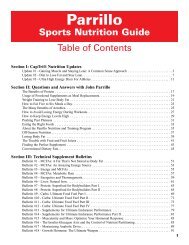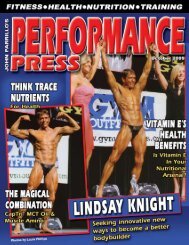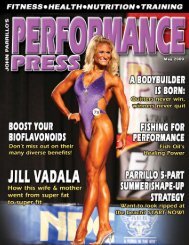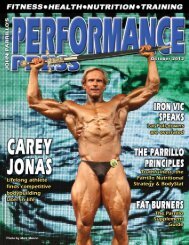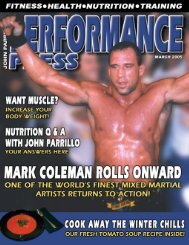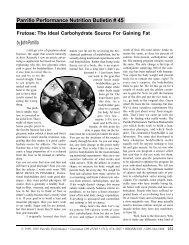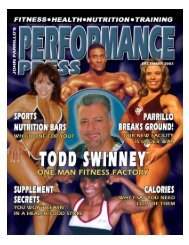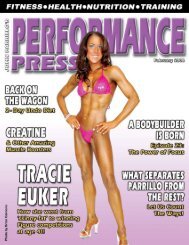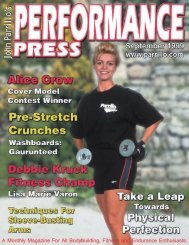John Parrillo's - Parrillo Performance
John Parrillo's - Parrillo Performance
John Parrillo's - Parrillo Performance
Create successful ePaper yourself
Turn your PDF publications into a flip-book with our unique Google optimized e-Paper software.
Leucine: An Amazing Branched-Chain Amino Acid<br />
<strong>Parrillo</strong> Muscle Amino<br />
Formula provides 400<br />
mg. of leucine for mindblowing<br />
muscular gains.<br />
• Induces the loss of body fat.<br />
Supplementation with BCAAs in<br />
which a majority of the formulation<br />
is leucine has been shown in<br />
research to trigger significant and<br />
preferential losses of visceral<br />
body fat. Located in the deeper layers<br />
of the body under the subcutaneous<br />
fat, visceral fat is often<br />
the hardest fat to lose and doesn’t<br />
respond well to dieting, particularly<br />
in women. This finding is significant<br />
because it indicates that<br />
leucine may be an effective natural<br />
supplement for fat loss as long<br />
as you select the correct formulation.<br />
The <strong>Parrillo</strong> Muscle Amino<br />
Formula contains 400 milligrams<br />
of l-leucine, 160 milligrams of l-isoleucine,<br />
and 160 milligrams of l-valine<br />
- the optimum balance for fatloss<br />
needs.<br />
• Stimulates protein synthesis in<br />
muscle. Leucine works together<br />
with the other branched chain<br />
amino acids to rebuild vital muscle<br />
tissue. The more muscle you have,<br />
the more efficiently your body<br />
burns fat. Further, research indicates<br />
that consuming BCAAs before<br />
or during endurance training<br />
may decrease, even prevent, the<br />
rate of protein degradation in the<br />
muscle and improve both mental<br />
and physical performance. It may<br />
also spare muscle glycogen stores<br />
so that you can train longer and<br />
harder, aerobically.<br />
Supplementing with Leucine and<br />
BCAAs<br />
As noted above, leucine can be depleted<br />
by intense aerobic exercise. Thus,<br />
it is important to keep your system well<br />
stocked with this amino acid, particularly<br />
during periods of hard training. In<br />
one study, during five weeks of speed<br />
and strength training, leucine supplementation<br />
of 50 milligrams per kilogram<br />
of bodyweight a day, along with a high<br />
We suggest taking our<br />
BCAA supplement with<br />
one of our carbohydrate<br />
drinks such as Pro Carb <br />
or 50/50 Plus .<br />
daily protein intake, prevented a decrease<br />
in leucine in power-trained athletes.<br />
(5)<br />
On the <strong>Parrillo</strong> Nutrition Program, we<br />
advise taking two or more capsules<br />
of our Muscle Amino Formula with<br />
each meal. If you eat five meals per<br />
day and take two capsules, you would<br />
consume 4000 milligrams, or 4 grams,<br />
of leucine daily – which is exactly the<br />
amount we suggest for a 200-pound<br />
bodybuilder. In all of our supplements,<br />
our suggested usages are<br />
based on scientific research. Research<br />
also specifies that leucine<br />
supplementation should be in conjunction<br />
with a high-protein eating<br />
plan. The leucine content of protein<br />
foods is thought to vary between five<br />
and ten percent. Each day, you should<br />
eat 1.25 to 1.5 grams of protein per<br />
pound of body weight. At least one<br />
gram of protein per pound of your<br />
body weight should come from complete<br />
protein sources such as lean<br />
white meat poultry, fish, egg whites,<br />
or protein powder. The remaining<br />
should come from starchy and fibrous<br />
carbohydrates, which also contain<br />
protein.<br />
When you supplement with leucine,<br />
do so with a carbohydrate as this<br />
speeds uptake. We suggest taking our<br />
BCAA supplement with one of our<br />
carbohydrate drinks, such as Pro<br />
Carb or 50/50 Plus .<br />
References<br />
1. Friedman, J.E., and P.W.R. Lemon.<br />
1989. Effect of chronic endurance exercise<br />
on retention of dietary protein. International<br />
Journal of Sports Medicine<br />
10: 1188, ff.<br />
2. Hickson, J.F., and I. Wolinsky. (eds.)<br />
1989. Human protein intake and metabolism<br />
in exercise. Nutrition in Exercise<br />
and Sport. CRC Press, pp. 5-36.<br />
3. Guyton, A.C. 1991. Textbook of Medical<br />
Physiology. W.B. Saunders.<br />
4. Zubay, G. 1983. Biochemistry.<br />
Addison-Wesley.<br />
5. Mero, A. 1999. Leucine supplementation<br />
and intensive training. Sports<br />
Medicine 27: 347-358.<br />
Info-Line: 513•531•1311 <strong>John</strong> <strong>Parrillo</strong>’s <strong>Performance</strong> Press • October 1999 9




